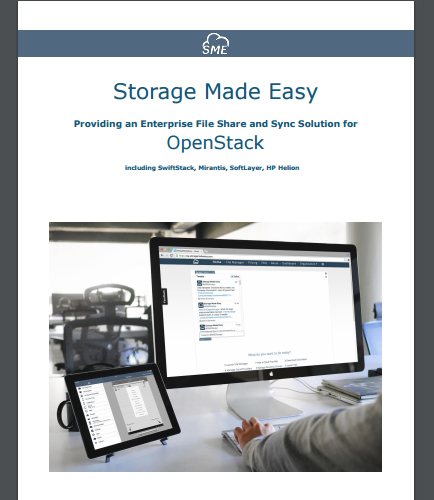
PROCESSING. PLEASE WAIT...

White Paper: Storage Made Easy
OpenStack Swift is becoming the foremost deployed Private Cloud Storage solution in the world. But OpenStack can end up storing a lot of structured documents such as Word, Powerpoint, Excel, and PDF files. An enterprise grade EFSS solution can help fix complexities by providing audit, security, encryption, back-up and migration capabilities to the files shared in your organization.
Read this whitepaper to know how you can get the below mentioned benefits by integrating OpenStack with a comprehensive Enterprise File Synchronization and Sharing (EFSS) solution.
Search the contents of files stored on OpenStack.
Unify OpenStack files and private data in a single interface for anywhere access.
Easily annotate against PDF documents stored on OpenStack.
Collaborative round trip creation and editing on documents stored on OpenStack.
CloudEdit functionality to edit Documents directly on a user's desktop and save any changes back to OpenStack Swift.
Create new or enhance existing dedicated OpenStack applications.

By: Storage Made Easy
Ceph is a free software storage platform designed to present object, block, and store files from a single distributed computer cluster. Ceph Object Storage is deployable in a fully scalable highly available architecture. But how can we extend the use of Ceph? This whitepaper will guide you in taking control of access to Ceph and explores topics like: Interacting easily with Ceph or share data using common protocols. CIFS Drive Access into Ceph from any desktop. Email integration with Ceph from Outlook/Mac Mail. Unifying Ceph files and private data. Search document content on files stored on Ceph. Enabling key data to be archived to Ceph easily. File sharing policies for Ceph. Enabling sensitive data to be encrypted with a private key prior to being stored on Ceph.
By: Parallels
For CIOs and CEOs, cloud computing security is still a hot topic for discussion. The debate continues as to whether a public, private or hybrid cloud approach is best. While there are complex factors that can inform a decision between public or private cloud, security is the biggest. Choosing public vs private cloud services can be challenging, it is important to analyze the differences between applications virtualized in a private cloud and those in a public cloud. This white paper compares public and private clouds in contrast to the basic elements, features and benefits that both delivers. This White Paper highlights: How Public and Private Cloud deployment models differs? Cloud Computing Security — Hosted or Local Applications? The trends in Public, Private, and Hybrid Cloud: Which is right for you? An Overview on Security with Private Cloud Computing Implementing Private Cloud Computing with minimal effort and seamless end user experience


 2025 All Rights Reserved | by: www.ciowhitepapersreview.com
2025 All Rights Reserved | by: www.ciowhitepapersreview.com